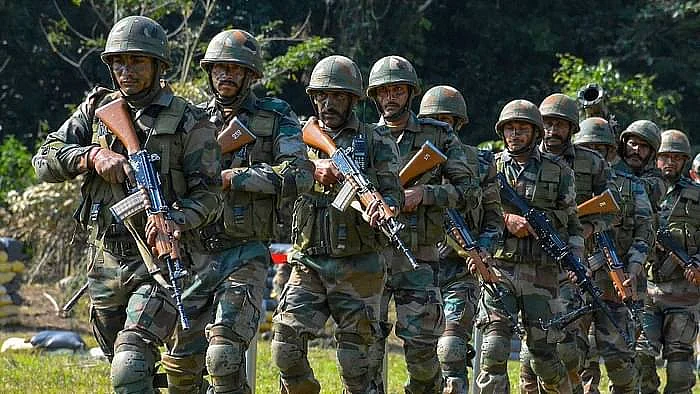Amid widespread protests, the government on Thursday, 16 June, increased the upper-age limit for recruitment under the Agnipath scheme to 23 years from 21 years for the year 2022. The Centre on Thursday, 16 June, also released a document called "Myths vs Facts," which addresses some concerns raised with regard to the recruitment plan in the armed forces.
What are the clarifications? Here's all you need to know.
Who framed the Agnipath policy?
Several former army officers had expressed anguish over not being consulted before the government's decision was announced.
The government, however, said that the proposal was framed by the Department of Military Officers, and that several former officers had recognised the advantages of the scheme and welcomed them.
What is the controversial scheme?
At least 40,000-50,000 soldiers will be recruited annually under the scheme – most of whom will leave in four years.
The average age profile in the armed forces is 32 years, and is expected to go down by at least six years. Once recruited, these soldiers will be called 'Agniveers.'
Around 25 percent of Agniveers will be allowed to serve for another 15 years under permanent commission. In the larger scheme of things, this new policy will reduce the defence pension bill, which has been a matter of concern for the central government.
The scheme is available only at the soldier level and not at the officer level.
Candidates between the ages of 17.5 and 21 years will be eligible to apply for the scheme. The first batch is expected to be selected by July 2023.
However, there have been several protests against the scheme since it was announced. Most recently, Army aspirants conducted protests in Gurugram, Delhi's Nangloi, Bihar, and Uttar Pradesh on Thursday. In Bihar's Kaimur district, a train was set on fire by anguished protesters.
What happens to Agniveers after four years?
The Centre said that those wishing to study further will be provided with a certificate equivalent to the completion of the 12th standard as well as a bridge course for further education. However, it is not clear whether they will be given certificates even if they don't clear the exams.
What are the job opportunities available to them?
Those who want to pursue paid jobs will be given preference in the Central Armed Police Forces (CAPF) and the state police force. "Several avenues are also being opened up for them in other sectors," the document said. However, there is no clarity on what will happen if the state governments choose otherwise.
Will there be any change in the regimental system because of Agnipath?
An issue raised by army veterans is that Agnipath would have an adverse impact on bonding within regiments. Responding to their apprehensions, the Centre said, "No change is being done to the regimental system. In fact, it will be further accentuated because the best of Agniveers will be selected, further boosting the cohesiveness of the unit."
What has the government said about Agniveers getting permanent commission in the armed forces?
The government also addressed concerns that the scheme could deter the effectiveness of the military, saying that such a concern was a myth and that the number of Agniveers who will be recruited in the first year would comprise a mere 3 percent of the armed forces.
"Additionally, the performance of the Agniveers will be tested before re-induction in the army after four years. Hence, the Army will get tested and tried personnel for supervisory ranks," the document added.
Is there a clarification on the impact of arms training on youth?
The government also responded to criticism that 21-year-olds were immature and unreliable to serve in the army, saying that most countries depend on their youth to defend them.
Further, it has been argued that youngsters with professional arms training may be susceptible to join terrorist organisations or "anti-national" groups. The Centre, however, has termed these fears "an insult to the ethos and values of the Indian armed forces."
It also highlighted the fact that the thousands who have retired from the armed forces over the years have not joined any anti-national forces despite possessing professional arms training.
